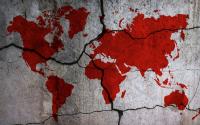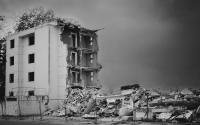16 October 2007Tom Phillips in Alta Floresta
 An area of cleared Amazonian rainforest in Novo Progreso, Brazil. Photograph: Alberto Cesar/Greenpeace/AP
An area of cleared Amazonian rainforest in Novo Progreso, Brazil. Photograph: Alberto Cesar/Greenpeace/AP
But as his 10-seater Cessna banked over a vast expanse of burning rainforest in the state of Mato Grosso, the pilot, who now works for the environmental group Greenpeace, was virtually speechless. "Holy shit," he blurted over the plane's PA system, as the plane swung sharply to the right towards an image of destruction which owed more to a scene from Apocalypse Now than the Amazon rainforest. "Just look at the size of what this guy is burning."
It is burning season in Brazil, and across the Amazon region, where illegal loggers, cattle ranchers and a growing number of soy producers continue their advance into their world's largest tropical forest, similar scenes are taking place. In August government satellites registered 16,592 fires across Brazil, the overwhelming majority in the Amazon.
For environmentalists the fires are one of the first indications that deforestation is once again on the rise. Over the last two years fears for the future of the Amazon have been tempered by news of a reduction in deforestation. In August the Brazilian government heralded a 30% drop in rainforest destruction - the result, it said, of a government deforestation plan launched in March 2004. The plan outlined the creation of conservation units and 19 anti-deforestation units in deforestation hotspots such as Novo Progresso and Apui.
Great achievement
Marina Silva, Brazil's environment minister, claimed the drop was a clear indication that the Action Plan for Amazon Deforestation Prevention and Control was working. "It is a great achievement for Brazilian society," she said.
Many, however, believe the good news is about to run out.
Already there are signs that rainforest destruction is gathering speed. Deforestation in the states of Mato Grosso and Para is reportedly rising, with chainsaws and forest fires levelling thousands of hectares of pristine forest. Figures released last week by Brazil's space agency, INPE, show that between May and July of this year there was a 200% rise in deforestation in Mato Grosso.
Further north, in the Amazon state of Para, local ranchers and environmental activists claim a similar process is under way. Flying over the south-western corner of Para the tell-tale signs that logging continues at a staggering rate are everywhere: in the illegal dirt tracks that trail through the forest and the trucks that are dotted along them; in the charred trees that litter the landscape; and most strikingly in the newly deforested areas, which have turned the landscape into a messy patchwork of dark green and dull brown.
"It [the level of deforestation] is definitely going to rise," said Agamenon da Silva Menezes, the president of the Rural Workers Union in the Amazon town of Novo Progresso and one of the region's most powerful farmers.
"Lula [president of Brazil) says what he says because it is beneficial for him. But this year they have chopped down much more. What I am supposed to say to the guys [to stop them?]" added Mr Menezes.
Mr Menezes compared the illegal actions of the loggers to the American invasion of Iraq. If George Bush could attack a country out of financial interest, why could the loggers not do the same to the rainforest, he wondered.
"If you were stood next to your house and there was a mahogany tree next to you which would be worth R$5,000 (£1,360) if you chopped it down and your son was there crying out with hunger what would you do?"
Activists claim that the spike in deforestation is a sign that the government's action plan has been largely ineffective. They argue that the recent reductions owe more to external economic factors such as the market price of soy and beef.
With ranchers now looking to cash in on rising prices, Marcelo Marquesini, a former inspector for Ibama (Brazilian ministry of the environment's enforcement agency) who now works for Greenpeace, says the outlook for the rainforest is bleak. "Brazilian society has to celebrate the reduction of deforestation over these three years. It genuinely did fall," said Mr Marquesini, whose organisation will next month launch a report criticising the government's failure to control this notoriously lawless region.
But, he added, "everything now leads us to believe that deforestation is going to rise again".
On the frontline of the government's battle against deforestation are men such as Decio Luiz Motta, a fresh-faced 38-year-old environmental inspector from Rio de Janeiro who heads a six-man taskforce in the dusty frontier town of Novo Progresso. Sitting at a rickety wooden table in the unit's improvised HQ, Mr Motta said progress was being made, pointing to the apprehension of 13 lorries carrying illegal wood the previous day. "Just our being here reduces what is happening," he said.
"The infrastructure we have is much better, you have people who know how to use satellite imagery, GPS. It used to be much more about following your nose. The monitoring teams would see smoke coming from a certain area and head there to check it out. Now we are much better equipped for this work."
Yet the challenges facing such inspectors are clear. Mr Motta's team has just three cars to police a huge and remote area of rainforest, for example.
The collusion of local residents with the loggers also made tackling deforestation more difficult. Mr Motta claimed that after a recent seizure of illegal wood in the nearby town of Castelo dos Sonhos the local petrol stations began to boycott the government inspectors, putting their vehicles temporarily out of action.
The region's loggers meanwhile are adamant that as long as the government gives them no economically viable alternative to logging, the deforestation will continue. "It is a farce," said Mr Menezes. "How are you going to take an area that has been mine for 20 years and tell me it is a conservation unit all of a sudden?"
Zero deforestation
He described the idea that a policy of "zero deforestation" could be introduced as "the biggest load of rubbish I have ever heard". Mr Menezes asked: "Where is he [President Lula] going to get 30,000 soldiers from to police the insides of this whole forest?"
Three thousand feet over the burning forest Paulo Adario, the Amazon director of Greenpeace, let out a sigh of resignation. "It's like a scene from a world war," he said gazing down at the forest, which now more resembled the aftermath of a napalm bombing.
"It is forbidden to sell cocaine, it's illegal to deal marijuana and it's illegal to molest little children," Mr Adario added with mix of frustration and irony. "And, as you can see, it is also illegal to destroy the Amazon rainforest."
http://www.guardian.co.uk/brazil/story/0,,2191877,00.html?gusrc=rss&feed=12






